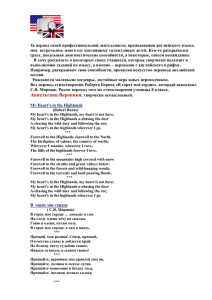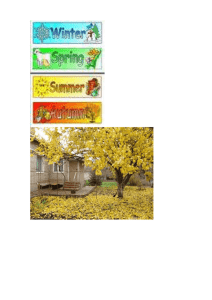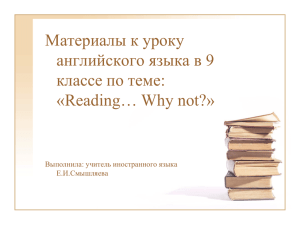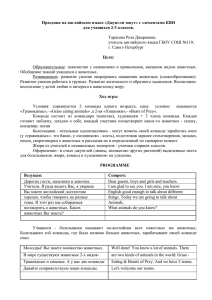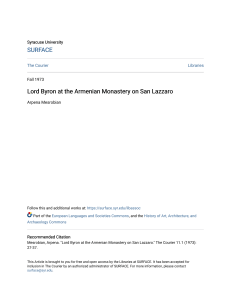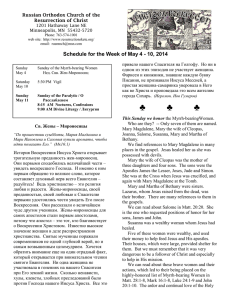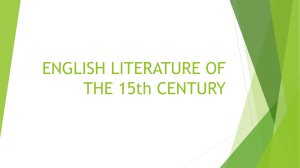Сценарий литер. вечера - Кладько Е.С., лицей №1560
advertisement
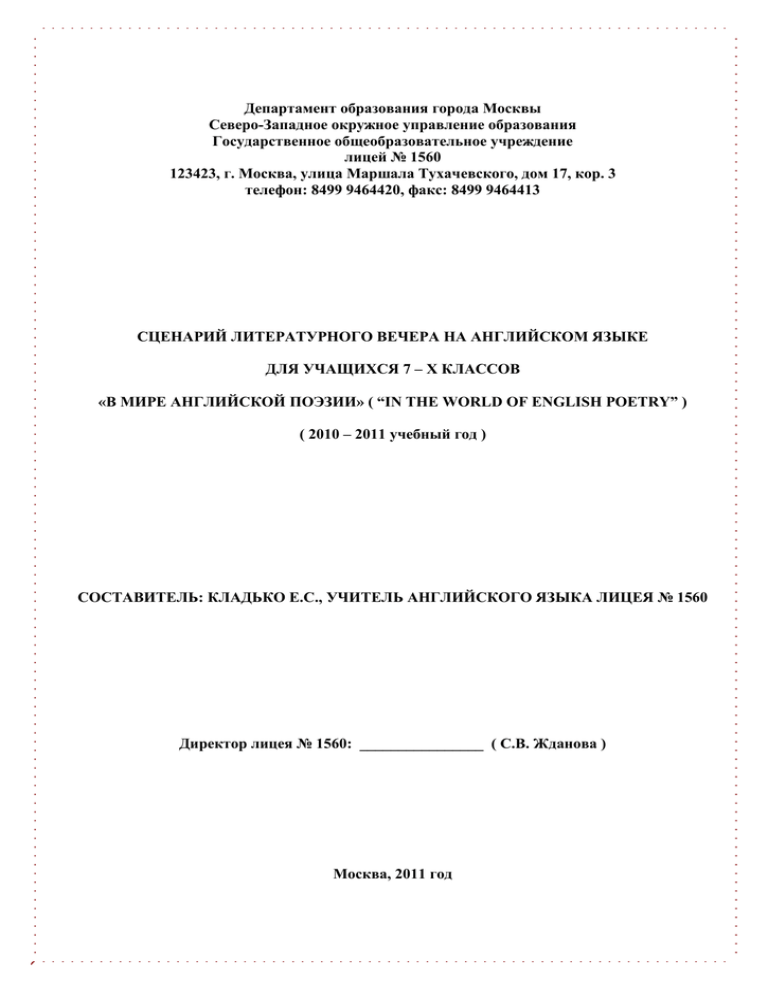
Департамент образования города Москвы Северо-Западное окружное управление образования Государственное общеобразовательное учреждение лицей № 1560 123423, г. Москва, улица Маршала Тухачевского, дом 17, кор. 3 телефон: 8499 9464420, факс: 8499 9464413 СЦЕНАРИЙ ЛИТЕРАТУРНОГО ВЕЧЕРА НА АНГЛИЙСКОМ ЯЗЫКЕ ДЛЯ УЧАЩИХСЯ 7 – Х КЛАССОВ «В МИРЕ АНГЛИЙСКОЙ ПОЭЗИИ» ( “IN THE WORLD OF ENGLISH POETRY” ) ( 2010 – 2011 учебный год ) СОСТАВИТЕЛЬ: КЛАДЬКО Е.С., УЧИТЕЛЬ АНГЛИЙСКОГО ЯЗЫКА ЛИЦЕЯ № 1560 Директор лицея № 1560: ________________ ( С.В. Жданова ) Москва, 2011 год Сценарий литературного вечера “In the World of English Poetry”. Составитель: учитель английского языка лицея № 1560 Кладько Е.С. Литературный вечер, посвящённый английским поэтам и их поэзии, проводится в 7-х классах. Данному мероприятию предшествует большая подготовительная работа, которая требует изучения дополнительного материала по теме «Английская литература». Мероприятие представляет собой литературный вечер, в котором принимают активное участие все учащиеся группы (или класса), изучающие английский язык. Для проведения этого вечера готовятся следующие материалы: фотографии, картины, плакаты с изображением страны изучаемого языка; компьютерная презентация, сопровождающая вечер; портреты тех поэтов, которым посвящён этот вечер; подбирается музыка для сопровождения музыкальных номеров. Важную роль в создании праздничной атмосферы данного мероприятия играет украшение помещения, где проводится вечер. Основная цель данного мероприятия заключается в привитии семиклассникам интереса и уважения к культуре и литературе страны изучаемого языка. Особенностью этого мероприятия является то, что оно универсально. Можно менять количество участников вечера, сокращать материал сценария, добавлять туда сведения о тех английских поэтах, творчество которых интересно для изучения. Можно добавить в сценарий драматизации стихотворений, а также авторские переводы стихотворных произведений, сделанные самими учащимися. Одним словом, данный сценарий может послужить толчком для коллективного творчества учителей и их учеников. Очень надеюсь, что так и будет. Литературный вечер “In the World of English Poetry” может быть подготовлен в любое время, а также к неделе иностранного языка в школе. Compere ( Student – 1 ): Good morning (afternoon), our dear friends! Welcome to our English party which is called “In The World Of English Poetry”. This party is devoted to the famous English poets of the past: Geoffrey Chaucer, William Shakespeare, Robert Burns, Thomas Moore and George Gordon Byron. Compere ( Student – 2 ): You know that all people like travelling. Some travel around their country, others travel abroad. Some people are fond of travelling into the future, others prefer to travel into the past. We invite you, our dear guests, to have an exciting trip into the remote past with the help of our imaginary Time Machine. It will carry you into the beautiful world of English poetry. Compere ( Student – 1 ): Make the first turn of our Time Machine and you will find yourselves in the 14th century when the greatest English poet Geoffrey Chaucer lived and worked. Student – 3: Geoffrey Chaucer (1340 – 1400) was the first great writer in English literature and is called the “father of English poetry”. He was born in London in the family of a wine merchant in 1340. At 17, Chaucer became a page to a lady at the court of Edward III. At 20, he was in France, serving as esquire. During 1373 and the next few years Chaucer travelled much and lived a busy life. He went to France and made three journeys to Italy. Italian literature opened to Chaucer a new world of art. Student – 4: When Chaucer came back to London, he received the post of Controller of the Customs in the port of London. He held his position for 10 years, but his duties grew very tiresome to the poet. And he asked the King several times for permission to give up his post. Finally, the King granted him a pension so that Chaucer could devote more time to his writings. Chaucer died in 1400 and was buried in Westminster Abbey. Geoffrey Chaucer was the last English writer of the Middle Ages and the first of the Renaissance. Student – 3: There are 3 periods in Chaucer’s literary activity: the French Period when “The Romance of the Rose” was written; the Italian Period when he wrote such poems as “The House of Fame”, “The Parliament of Birds”, “The Legend of Good Women” and the English Period. It was at this time when he wrote his masterpiece, “The Canterbury Tales”. Student – 4: “The Canterbury Tales” is a collection of stories told by a group of pilgrims who were travelling from London to Canterbury. Chaucer opens his work with a prologue to the whole story. It acquaints the reader with medieval society. The pilgrims are persons of different social ranks and occupations. There is a knight, a yeoman, a nun, a monk, a merchant, a clerk, Chaucer himself and others. Each of the travellers tells a different kind of story showing his own views and character. Some are comical, gay, witty or romantic, others are serious and even tragic. Compere ( Student – 2 ): And now let’s listen to this prologue. Unfortunately, the English language of the Middle Ages is very difficult to learn and understand, so there is a Russian translation of the beginning of the prologue made by Ivan Kashkin. Student – 5 (recites the prologue in Russian): Когда Апрель обильными дождями Разрыхлил землю, взрытую ростками, И, мартовскую жажду утоля, От корня до зелёного стебля Набухли жилки той весенней силой, Что в каждой роще почки распустила, А солнце юное в своём пути Весь Овна знак успело обойти, И, ни на миг в ночи не засыпая, Без умолку звенели птичьи стаи, Так сердце им встревожил зов весны, Тогда со всех концов родной страны Паломников бессчётных вереницы Мощам заморским снова поклониться Стремились истово; но многих влёк Фома Бекет, святой, что им помог В беде иль исцелил недуг старинный, Сам смерть приняв, как мученик безвинный. Случилось мне в ту пору завернуть В харчевню «Табард», в Соуэрке, Свой путь свершая в Кентербери по обету; Здесь ненароком повстречал я эту Компанию. Их 29 было. Цель общая в пути соединила Их дружбою; они – в пример всем нам – Шли поклониться праведным мощам. Конюшен, комнат в «Табарде» немало, И никогда в нём тесно не бывало. Едва обильный ужин отошёл, Как я уже со многими нашёл Знакомых общих или подружился И путь их разделить уговорился. Compere ( Student – 1 ): The next destination of our Time Machine is a small provincial town of Stratford-on-Avon where William Shakespeare, the great poet and dramatist, was born. Student – 6: William Shakespeare (1564 – 1616) was born on April 23rd, 1564 in the family of a prosperous tradesman. In his childhood William went to the Stratford Grammar School. When he was 19, he married Anne Hathaway, the daughter of a well-to-do farmer. They had three children – one boy and two girls. A few years later after his marriage, about the year 1587, Shakespeare left his native town for London. There he became an actor and then the main playwright of the Lord Chamberlain’s company of actors. He wrote plays for the company and acted in them. His career as a dramatist lasted for nearly twenty-one years. In 1597 Shakespeare bought a house in Stratford and in 1612 he returned to Stratford to spend the last years of his life in his native town. Shakespeare died on April 23 rd, 1616. He was buried at the Holy Trinity Church in Stratford-on-Avon. A monument was erected to the memory of the great playwright in Westminster Abbey. Student – 7: Shakespeare wrote 37 plays, 154 sonnets and two narrative poems. Among Shakespeare’s plays are histories (chronicle plays) such as “Henry VII”, “Richard III”; tragedies such as “Hamlet”, “Othello”, “King Lear”, “Macbeth”, “Romeo and Juliet”; comedies such as “The Taming of the Shrew”, “Much Ado About Nothing”, “Twelfth Night” and romantic dramas “The Winter’s Tale” and “The Tempest”. Shakespeare’s sonnets occupy a unique place in his literary legacy. There are three main characters in his sonnets: the Young Man, the Dark Lady and the Rival Poet. The main theme of most of Shakespeare’s sonnets is love and friendship. Compere ( Student – 2 ): Now let’s listen to one of Shakespeare’s sonnets, first in English and then translated into Russian by Samuel Marshak. Student – 8 (recites Sonnet 18th in English): SONNET 18TH. Shall I compare you to a Summer’s day? You are more lovely and more temperate: Rough winds do shake the daling buds of May, And Summer’s lease has all too short a date: Sometimes too hot the eye of heaven shines, And often is his gold complexion dimm’d; And every fair from fair sometimes declines, By chance, or nature’s changing course untrimm’d: But your eternal Summer shall not fade, Nor lose possession of that fair you ow’st; Nor shall Death brag you wander’st in his shade, When in eternal lines to time you grow’st: So long as men can breathe or eyes can see, So long lives this, and this gives life to thee. Student – 9 (recites Sonnet 18th in Russian): СОНЕТ 18. Сравню ли с летним днём твои черты? Но ты милей, умеренней и краше. Ломает буря майские цветы, И так недолговечно лето наше! То нам слепит глаза небесный глаз, То светлый лик скрывает непогода. Ласкает, нежит и терзает нас Своей случайной прихотью природа. А у тебя не убывает день, Не увядает солнечное лето. И смертная тебя не скроет тень – Ты будешь вечно жить в строках поэта. Среди живых ты будешь до тех пор, Доколе дышит грудь и видит взор. Compere ( Student – 1 ): Now with the help of our Time Machine we’ll fly over into Scotland, to the Highlands, where the greatest Scottish poet, Robert Burns, was born. Student – 10: Robert Burns (1759 – 1796) is the national pride of Scotland. He was born in the north of Scotland in a small village Alloway in 1759. His father, William Burns, was a gardener and a farmer. Though Burns’ father was poor, he wanted to give his children the best education he could. So he began to teach them to read and write when they were very young. Robert and his brother Gilbert went to school and helped their father on the farm. Those were hard times, but in spite of that Robert began to write when he was 15 years old. Burns wrote many poems in English, but the best of his works were written in Scottish, the language of his native Scotland. In his poems he described with love and understanding the simple life he knew, and his poems touch the heart of every reader. Student – 11: The source of Burns’ poetry is the life of common toilers and Scottish folklore. Among his wellknown poems are “Jolly Beggars”, “To a Mouse”, “The Two Dogs”, “John Barleycorn”, “Auld Lang Syne”, “My Heart’s in the Highlands”, “The Tree of Liberty”. He gave 200 songs to the Scots Musical Museum, among them such well-known ones as “John Anderson”, “My Joe” and some others. The poet died in 1796 at the age of 37. Now Robert Burns is Scotland’s national poet, and January 25 th – the day of his birth – is always celebrated in his country and in other countries of the world. Compere ( Student – 2 ): As for me, I like Burns’ poetry very much, especially “My Heart’s in the Highlands”. Let’s listen to it, first in English and then in Russian translated by Samuel Marshak. Student – 12 (recites the poem “My Heart’s in the Highlands…”): My heart’s in the Highlands, my heart is not here, My heart’s in the Highlands, a-chasing the deer, A-chasing the wild deer, and following the roe, My heart’s in the Highlands, wherever I go! Farewell to the Highlands, farewell to the North, The birthplace of valour, the country of worth; Wherever I wander, wherever I rove, The hills of the Highlands for ever I love. Farewell to the mountains high covered with snow; Farewell to the straths and green valleys below; Farewell to the forests and wild-hanging woods; Farewell to the torrents and loud-pouring floods! My heart’s in the Highlands, my heart is not here, My heart’s in the Highlands, a-chasing the deer, A-chasing the wild deer, and following the roe, My heart’s in the Highlands, wherever I go! Student – 13 ( recites the poem in Russian ): «В горах моё сердце…» В горах моё сердце… Доныне я там. По следу оленя лечу по скалам. Гоню я оленя, пугаю козу. В горах моё сердце, а сам я внизу. Прощайте, вершины под кровлей снегов, Прощайте, долины и скаты лугов, Прощайте, поникшие в бездну леса, Прощайте, потоков лесных голоса. Прощай, моя родина! Север, прощай, Отечество славы и доблести край. По белому свету судьбою гоним, Навеки останусь я сыном твоим! В горах моё сердце… Доныне я там. По следу оленя лечу по скалам. Гоню я оленя, пугаю козу. В горах моё сердце, а сам я внизу. Compere ( Student – 1 ): A brilliant poem, isn’t it? But it’s high time to continue our imaginary journey. One more turn of our Time Machine and it takes us into Ireland where Thomas Moore, the Irish poet-romantic, was born in Dublin in 1779. In 1795 Moore entered Trinity College. After graduating from Trinity, Moore studied law in London. His first book, “Odes of Anacreon” was a success. Moore travelled a lot and visited the West Indies and the United States. He returned to London in 1804 and lived there the rest of his life. Moore died on February 25th, 1852. Compere ( Student – 2 ): Thomas Moore wrote the worldwide-known poem “Those Evening Bells” in a village Mayfield. “Those Evening Bells” were inspired by the sound of the bells of Ashbourne Church just across the river. At the same time in 1779 Ivan Ivanovich Kozlov was born in Moscow. Ivan Kozlov was not only an excellent poet of his time, but he also translated many poems of English, Italian and Polish writers into Russian. Kozlov translated Moore’s poem “Those Evening Bells”. Then Stanislav Monushko and Alexander Grechaninov composed music to this poem and it became a very popular Russian song. Let’s listen to it. The students sing “Those Evening Bells” in English and in Russian: Those evening bells! Those evening bells! How many a tale their music tells, Of youth, and home, and that sweet time, When last I heard their soothing chime. Вечерний звон, вечерний звон! Как много дум наводит он О юных днях в краю родном, Где я любил, где отчий дом, И как я с ним навек простясь, Там слушал звон в последний раз! And so ‘twill be when I’m gone; That tuneful peal will still ring on While other bards shall walk these dells, And sing your praise, sweet evening bells! Compere ( Student – 1 ): Well done! Thank you for such a great pleasure! And now let’s make the last turn of our Time Machine and it carries us into the beginning of the 19th century. The greatest poet of that time is George Gordon Byron. Student – 14: George Gordon Byron (1788 – 1824), the great romantic poet, was born in London, in 1788 in an old aristocratic family. At 17, Byron entered Cambridge University and there his literary career began. In 1807 he published his first collection of poems “Hours of Idleness”. In 1808 Byron graduated from the University and in 1809 he left England for a long journey. He visited Portugal, Spain, Albania, Greece and Turkey. Byron described his travels in a long poem “Childe Harold’s Pilgrimage”. Between 1813 and 1816 Byron composed his “Oriental Tales”: “The Giaour”, “The Corsair”, “Lara” and others. In 1817 Byron went to Italy where he lived until 1823. In Italy Byron wrote many of his best poems: “Don Juan”, “The Vision of Judgement” and “The Age of Bronze”. In 1823 Byron went to Greece and joined the people of Greece in their struggle for independence against Turkey. The struggle for independence had become the aim of Byron’s life. Student – 15: In the Greek town of Missolongi Byron fell ill with typhus and died in April 18th, 1824. He was only 36 years old. His friends brought Byron’s body to England and he was buried in Newstead, his native place. Only in 1969 the authorities finally allowed his remains to be buried in the Poets’ Corner in Westminster Abbey. I’d like to tell you about the poem “Childe Harold’s Pilgrimage”. It is a story about travel, history and politics. Childe Harold is a young aristocrat, who is not happy in his country. He goes travelling and hopes to find happiness among people far from civilization. When the poem first appeared in print, many people believed that Byron’s own character was presented in the person of Childe Harold but the author denied it. He justly considered himself to be an active fighter for freedom, while Harold was merely a passive onlooker. Compere ( Student – 2 ): Childe Harold leaves his country for Portugal and Spain; when his ship is far from the shores of England, he says Good Night to his Motherland. Student – 16 ( recites the fragment of the poem “Childe Harold’s Pilgrimage” ) Good Night. (Canto the First). Adieu! Adieu! My native shore Fades o’er the waters blue; The night-winds sigh, the breakers roar, And shrieks the wild sea-mew. Yon sun that sets upon the sea We follow in his flight. Farewell awhile to him and thee, My native Land – Good Night! A few short hours and he will rise To give the morrow birth; And I shall hail the main and skies, But not my mother earth. Deserted is my own good hall, Its hearth is desolate; Wild weeds are growing on the wall, My dog howls at the gate. Student – 17 ( recites the fragment of the poem “Childe Harold’s Pilgrimage” in Russian ): Песня 1. ( отрывок ). Дж. Гордон Байрон. Прощай, прощай! Мой брег родной В лазури вод поник, Вздыхает бриз, ревёт прибой, И чайки вьётся крик. Скрывают солнце волн хребты, У нас одни пути. Прощай же, солнце, с ним и ты, Родной мой край, прости! Недолог срок – и вновь оно Взойдёт, а я привет Лишь морю с небом шлю: давно Земли родимой нет. Пуст отчий дом, остыл очаг, И вихрь золу разнёс: На гребне стен пророс сорняк, У входа воет пёс. ( Перевод Г. Шенгели ). Compere ( Student – 1 ): So our Time Machine helped us to make a fascinating journey to the world of English poetry. And finishing our party, we’ll sing a song “Auld Lang Syne” by Robert Burns. All the students sing the song “Auld Lang Syne” in English and in Russian. Should auld acquaintance be forgot And never brought to mind? Should auld acquaintance be forgot And days of auld lang syne? Забыть ли старую любовь И не грустить о ней? Забыть ли старую любовь И дружбу прежних дней? For auld lang syne, my dear, For auld lang syne? We’ll take a cup of kindness yet. For auld lang syne! За дружбу старую – до дна, За счастье прежних дней! С тобой мы выпьем, старина, За счастье прежних дней! Compere ( Student – 2 ): And now, dear guests, our party is over. Thank you for your attention. We hope you’ve known much interesting information about great English poets, their life and their literary activities. SOURCES. “English & American Literature” (A course of lectures for schools and universities). ( Saint Petersburg, “Corona print”, 2004 ). “Teachers & Students’ Guide to the British Literature” ( Moscow, “Iris Press”, 2002 ). “Guide to English and American Literature” ( Moscow, “Manager”, 1997 ).
